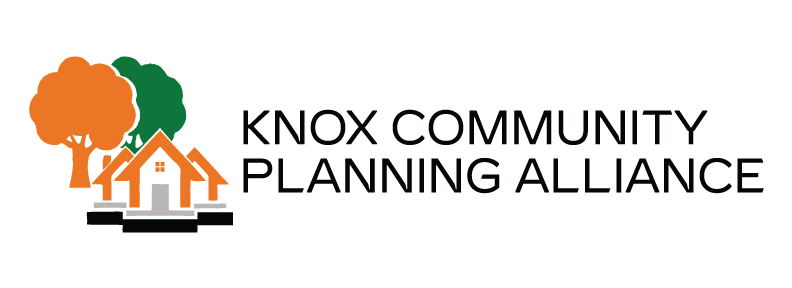Members of the KCPA Board of Advocates attended the Knox County Commission Chairman’s Briefing on Monday, June 7 to hear from those leading the efforts – Director of Knoxville Knox County Planning Commission, Amy Brooks, TPO’s Jeff Welch, Knox County Director of Engineering and Public Works, Jim Snowden, and Director of Knox County Constituent Services, Mandi Benedict.
The Chairman’s Briefing is a monthly educational / informational meeting that provides an opportunity for County Commissioners to learn more about government processes, policies, departments, projects, and other matters related to their overall scope of authority. With that said, we were a bit disappointed that more commissioners were not in attendance, seeing as how planning and land use consumes a significant chunk of their time and is the number one topic of citizen calls received by Constituent Services. Four of eleven were present.
The presentation kicked off with Amy Brooks providing some history on the Growth Policy Plan Act (TCA 6-58-101, Title 13) which requires municipalities to create a 20 year comprehensive growth plan with recommended reviews and revisions every 3-5 years. The Knoxville, Knox County, Town of Farragut Growth Policy Plan (GPP)was created in 2000 and has never been reviewed or revised since its inception and there has been ongoing debate if the plan, or even just the land use designation map, has sunsetted. Director Brooks then touched on the County’s 2003 General Plan, which is a 30 year road map for growth and development which should be reviewed and revised every 2- 3 years. Again, it was pointed out that the General Plan, like the GPP, has not been reviewed or revised since its origination.
Director Brooks responded to a question by Knox County Commission, Chairman Larsen Jay, as to the required frequency and schedule of updating these plans. Director Brooks shared that there is not an established schedule, but as earlier stated, these plans should be updated regularly to remain relevant. Director Brooks added that it is the desire of County Mayor Glenn Jacobs that these plans stay up to date and current from this point forward. History tells us that many of the plans and studies funded and conducted have been used as advisory tools or resources by County Commissioners and Planning Commissioners, with the exception of the land use designation map in the Growth Policy Plan. Director Brooks provided a few examples with some background – the Hillside and Ridgetop Plan was created to ensure best practices regarding slope, but was not adopted by County Commission in 2011. Another example was the 2019 Hardin Valley Mobility Study where County Commission voted to change the language in the study to advisory. This discussion generated a question from KCPA…”will this plan be codified in any way?”. The answer, in short, it will be left up to County Commission to make that decision.
There was a brief dialogue among Commissioners and Director Brooks about projects in the queue or on their “work program”, Western Avenue Corridor Study and Alcoa Highway among the top priorities. Another topic of discussion was will the General Plan address zoning reviews prior to concept plans and or use on reviews. Director Brooks explained that there is a need to review and revise zoning ordinances in the county and that by modernizing those zoning ordinances, uses will be more defined during earlier phases of the land use process. She added, that the General Plan presents a great opportunity to look at the step by step process.
Jeff Welch, with Regional Transportation Planning, spoke on the unique and correct approach that the county is taking by looking at growth and development simultaneously with transportation planning. Mr. Welch discussed briefly the Transportation Improvement Plan (TIP) which includes capital improvements for 2020-2023, and the 2045 Mobility Plan which is a vision plan. During Mr. Welch’s presentation, he stated that nearly 70,000 people living in Knox County commute out of the area for work with 60,000 commuting into Knox County for work. Following his presentation, there was discussion about market trends and development does not follow roads…roads follow development and that creates many challenges for municipalities and citizens.
More discussion followed the presentation from Director Jim Snowden on countywide transportation plans. Director Snowden explained that new tools have aided his department in the determination of road improvement projects based on crash studies, severity, volume, road conditions, and widths. Director Snowden stated that it is the focus of the County Mayor to align smart growth with smart infrastructure and by combining the comprehensive land use plan with the transportation plan, the county hopes to achieve this. Director Snowden shared insight into the lengthy time factor with transportation improvements and how funding sources, such as Federal, State, and Local, drive the timeframe of road projects. He touched on the the 3-5 year process for NEPA, the National Environmental Policy Act, and the resources needed to fund capital improvements. Currently, the transportation capital improvement budget is around $15 million. When asked by Commissioner Terry Hill how much would be needed to address the top ten, he responded $75 million, which indicates that recommendations from the forthcoming combined general and transportation plan may not be addressed in the near future.
Questions from the public included if the plan will be updated frequently, what is the best way to keep it updated, what are the priorities, who are the key stakeholders, will zoning be addressed, will the map in the GPP be updated, will a cost benefit analysis be included, how likely is the plan to be codified, how will post Covid population trends be addressed, and how long will this process take? The answers included a lot of optimism and hope that this plan will be warmly welcomed by stakeholders, county officials, and community partners. We share this hope and optimism.
The letter of interest was released on May 24, 2021, consultant interviews will begin in mid August, a consultant team will be selected August 27, and the project will kick off Fall 2021 and is projected to take approximately 18 months. The update process will include county partnerships with the school system, Town of Farragut, the city of Knoxville, utility districts, transportation organizations, and community groups.

